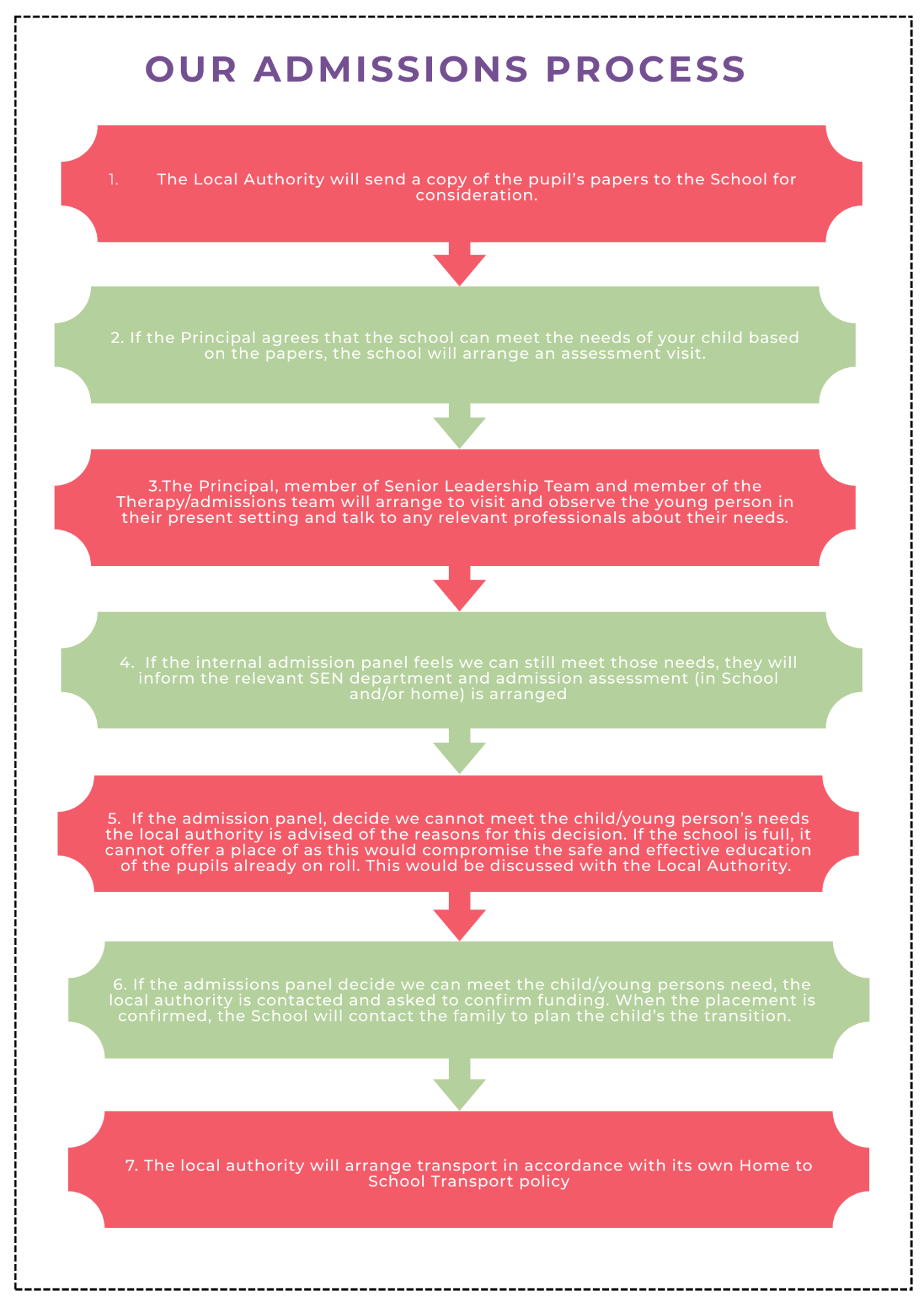Admissions
Liberty Academy Trust is a publicly funded multi-academy trust (MAT), which currently provides day places for autistic children and young people.
All schools within the Trust work in partnership with Local Authorities and parents / carers to assess the suitability of new admissions.
Typical Profile of Admissions
All applications for places will be in accordance with the Liberty Academy Trust funding agreement, the Special educational needs and disability code of practice 2015 and the School Admissions Code 2021. The school is required by its funding agreement to comply with these codes, and with the law relating to admissions as set out in the School Standards and Framework Act 1998.
All schools within Liberty Academy Trust are designated as autism specific. They accept local authority referrals on behalf of pupil who have an autism spectrum diagnosis (or are awaiting diagnosis and are recognised by professionals as having social communication difficulties that cause a major barrier to learning) in accordance with the admissions procedure set out below.
It is necessary for pupils to have an existing or proposed Education, Health and Care plan (EHC) which makes clear reference to a diagnosis of autism (but not with a Severe Learning Difficulty specified). In addition to an autism spectrum diagnosis, the EHC plan may include similar presenting features such as language, sensory, behaviour or communication difficulties.
Our pupils work at broadly age-related levels of attainment and we anticipate that they will gain a range of qualifications, including functional skills and GCSEs/Level 2 courses.
Pupils may also have additional needs, for example obsessive compulsive disorder (OCD) or attention deficit hyperactivity disorder (ADHD). Pupils may also have associated needs in the areas of emotional, social and communication and interaction development and/or psychological or mental health difficulties. In addition, pupils may have sensory, or physical/motor difficulties.
We strongly encourage places for pupils who have a diagnosis of autism and who are ‘Looked After Pupil’ (LAC) by their Local Authority. We prioritise these children in our application of over subscription criteria.
Where possible, an identified and agreed number of pupil placements will be available within each key stage. This is to facilitate age appropriate peer groups, progression and organisation of timetable.
There is a specified Admissions Priority Area (APA) for each school that is usually within 30 miles or 45 minutes travel time (based on Google maps) from the School. However, where it is in the best interests of the pupil, consideration will be given to pupils living further away, subject to suitability and impact on an individual’s welfare. This will be determined on a need led individual basis.
Our schools are unable to offer places to families who wish to privately fund the placement.
Admissions Procedure
Places will be allocated to pupils in accordance with the procedure set out below. Parents are welcome to arrange to visit the school and to request information about the school (including the admission process). Parents should inform their Local Authority of their preference for a place at the school and may ask their Local Authority to name the school in their pupil’s EHC Plan.
On some occasions, Local Authority professionals who are involved in a pupil’s placement or who have a significant professional interest in their wellbeing, may recommend that the school may meet their needs and inform parents. The school can only proceed to the admissions stage with Local Authority support. We therefore encourage parents to engage in a dialogue with their Local Authority to express a preference for the school.
Pupil with an EHC plan where the local authority intends to name the school
- Where the local authority intends to name the school in an EHC plan, the school will consider the proposal and will consent to being named, except where admitting the pupil would be incompatible with the provision of efficient education for other pupil, and where no reasonable steps can be made to secure compatibility.
- In deciding whether a pupil’s inclusion would be incompatible with the efficient education of existing pupils, the school will have regard to the Special Educational Needs Code of Practice 2015.
- If the school determines that admitting the pupil would be incompatible with the provision of efficient education, it will, within 15 days of the local authority’s notice, notify the Local Authority that it does not agree that the school should be named in the EHC Plan. The school will set out the facts and matters it relies upon in support of its contention that admitting that pupil would be incompatible with efficiently educating other pupil; and the school cannot take reasonable steps to secure compatibility.
- Where The school considers that it should not have been named in the EHC Plan, the School may ask the Secretary of State to determine that the Local Authority has acted unreasonably in naming it and to make an order directing the Local Authority to amend the pupil’s EHC Plan by removing the name of the school.
Pupil Without an EHC Plan
- The school may admit a pupil to the school if:
- He/she is admitted for the purposes of an assessment of his educational needs with agreement with the Local Authority, the pupil’s parents and any person whose advice is to be sought in accordance with regulation 7 of the Education (Special Educational Needs) (England) (Consolidation) (Regulations) 2001;
- He/she remains admitted following an assessment of his educational needs;
- He/she is admitted following a change in his/her circumstances, with the agreement of the local authority, the school and the pupil’s parents.
- If a pupil without an EHC Plan has been admitted to the school for the purpose of an assessment (in accordance with paragraph 1(a) above, the school will allow the pupil to remain at the school until the expiry of ten school days after the Local Authority serve a notice that they do not propose to make an EHC Plan, or until an EHC Plan is made.
The school will always provide the Local Authority with views to help with the decision-making process. In order to do this, the school can undertake further assessments of prospective pupils to establish whether the school can meet their needs. At the request of the Local Authority (and having received appropriate paperwork), the school assessment team will observe/assess the pupil at their home or current school.
Where possible, the school will meet parents and analyse reports from previous school placements in order to understand how best to meet the pupil’s needs. It is expected that recent (within 6 months prior to referral initiation) and relevant (based upon current pupil placement situation and individual and identified need) professional reports will be provided by those working directly with the pupil, or by the Local Authority lead. Where reports are not available and/or further information is required, the school will arrange a more detailed assessment route and report findings to confirm for admission.
Behaviour that Challenges
We will not refuse to admit a child solely on grounds of behaviour that challenges, in the normal admissions round or at any point in the normal year of entry. We may however, take into account compatibility of others and in some cases not be able to admit a pupil on the grounds that admitting them to the school would have an adverse effect on the current pupils or the provision we offer (as per paragraph 9.79 of the SEN Code of Practice 2015).
We may refuse admission in certain cases where the specific criteria listed in the School Admissions Code (paragraph 3.8) apply, i.e. where section 87 of the School Standards and Framework Act 1998 is engaged.
Oversubscription Criteria
Each Liberty school will seek to work collaboratively with all neighbouring Local Authorities to manage referrals. Where there are more applicants than vacancies, places will be prioritised according to the Admissions Criteria, which also acts as the Oversubscription Criteria.
The school will also prioritise applications in accordance with the following oversubscription criteria, in order:
- Children who are looked after or are previously looked after child;
- Children who are eligible for the pupil premium, [or] service premium [or early years premium];
Oversubscription should not impact the safety and wellbeing of pupils or appropriate staff/pupil ratios.
Appeals
Should a placement be considered unsuitable for a pupil (following the admissions procedure) feedback to parents/carers will be provided by the Local Authority as to the grounds for the decision.
If the Local Authority decides not to name the school in a pupil’s EHC Plan the parents have the right to appeal to the First-Tier Tribunal (Special Educational Needs and Disability) and should refer directly to the Local Authority for contact details and their intention to appeal a decision.
Withdrawing Places
In certain circumstances the Trust may decide to withdraw a place, following consultation the with Local Authority, if one of the following circumstances occurs:
-
- Where a parent has not responded to the offer of a place, even after chasing;
- Where fraudulent or intentionally misleading information is used as part of the application; or
- Where the offer has been made in error.
The offer will only be withdrawn following written agreement from the Local Authority.

